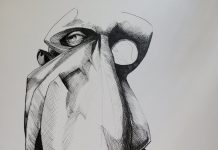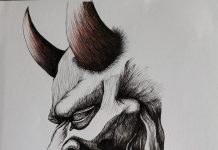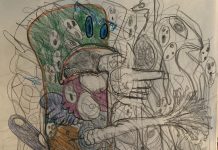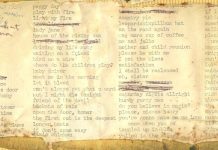Everyone believes the crippled kid. A blind and mute paraplegic from birth, the crippled kid lets his older brother, Junior, pad his red wagon with a patchwork quilt and canvas pillow of turkey feathers, cradle his body and set him inside so the family Bassett hound, Arsenal, can strap on a jump-rope harness and tow him like a pony trotting a lifeless load of tripe down a quarter mile of country road to the square in a small 1950’s Indiana town—say, Mechanicsburg or Shelbyville—to sell his mother’s gingerbread to local merchants and lovable layabouts who lounge among the swaying black-eyed Susans on ornate benches the Ladies’ Benevolent Society has painted bright green. Every morning except Sunday, the kid’s dad, a laconic ex-bombardier with royal Welsh ancestry and Popeye forearms, packs a ham sandwich and thermos of vegetable soup in a dented gray lunch pail and bumbles down a rutted dirt road in a plumber’s truck with a hiccupping tailpipe, whistling mongrel symphonies and dreaming harmless schemes.
Gradually, people perceive that the crippled kid sneezes twice for “yes” and once for “no.” So when Mr. Fitzwilliam, the barber, stands smiling outside his shop on Main Street, polishing large pointy scissors with a threadbare bandana, and asks if Mr. Blaymires of Blaymires’s Emporium is a werewolf—and the kid sneezes twice—Mr. Fitzwilliam phones the sheriff, Duke Turnbull, and Duke comes galloping down from the station, badge flashing and nightstick waggling, and shoots Mr. Blaymires point blank as he fills a customer order for Mrs. Hotchkiss’s Epsom Salts. Everyone including beefy-faced, steely-eyed Duke stands in a semi-circle, a solemn chorus of nodding, watching the alien liquid ooze out of the smoking hole in Mr. Blaymires, a sticky red substance that congeals and blackens the maroon checkerboard tile floor, confirming that Mr. Blaymires was indeed some horrific mutant with bizarre humors animating his freakish, beastly being.
Gingerbread sales are good all the way through Labor Day, with double sneezes wiping out the teachers and student body at Goober T. Ferrell Elementary, the crew and cashier—the Henckman Brothers, and Wanda Peachtree—at Snappy Service Auto Repair, and the mayor and town council and three goat-bearded drifters who smuggle bootlegged gingerbread in from Kentucky to try to make trouble. Seven times, single sneezes save the kid’s mother and father, who in the final scene tousle the hair of Junior (his mother licking her palm and plastering down his stiff red cowlick, which boings back up like Junior’s latest erection). Junior sits on the stained pine patio, gnawing a huge fried chicken leg, smiling eerily with his freckles and black eye into the camera, after which the shot pans to the parents—the father in tatty overalls and red checkered shirt, the mother in her cornflower housedress, wiping her hands on her flimsy apron—and we suddenly understand that Arsenal has mysteriously disappeared and that propelled by some demonic momentum the little red wagon continues to roll on its own over the stony back roads, heaping gingerbread on the town, making a spicy brown mound that rises to the sky like a mass grave, and both folks pivot to face us like figurines turned by an invisible hand, their smiles a creepy confusion of sunshine and midnight, the mother’s scarred nails picking at the knot in her apron strings, a close-up on the father’s knuckles ingrained with oil as he unbuckles a denim strap, and in sullen synchronicity they reveal themselves to be people who never suspected anything evil could come from under their roof.































